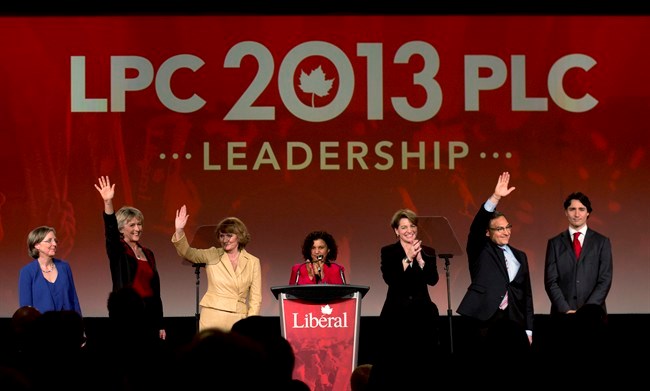OTTAWA - For every Liberal lapel pin on a partisan at the party's leadership forum Sunday, there were thousands more digital booster badges tagged to supporters' social media profiles.
From Twitter posts celebrating a vote cast to Facebook status updates congratulating Justin Trudeau for winning his party's crown, the enthusiasm among party faithful spilled beyond the Ottawa event and into the online world.
"We did it. Just about to go on stage, but wanted to thank my volunteers for all that you've done," a post on Trudeau's Twitter account read, seconds after his win was announced.
"This is your victory. Thank you."
Though the physical campaign buttons may perhaps earn a few bucks one day in an online auction, the digital displays could be worth a fortune — for the party.
While much has been made about the quantity of online support amassed by candidates and the party alike during the leadership contest, the political benefit may come more from the quality.
Political parties have long collected reams of data on their supporters, usually via telephone polls, door knocking and other traditional methods.
Rebuilding the party machine is a key part of the Liberals' renewal process, former interim leader Bob Rae told the convention Sunday.
"It's not enough to have good ideas, you have to be a party that's able to fight back, to organize, able to do the work on the ground, the work that needs to be done if we want to win," Rae said in a speech.
"And that's what's essential if we want to win in 2015."
Social media has opened up a new avenue for data collection that yields a depth of information about potential supporters that previously was harder, and more expensive, to come by.
Now each social media user, by virtue of their profiles, offers up a trove of personal information each time they hit "like" on a Liberal party page or sign up to follow someone on Twitter.
Those details can in turn help parties create databases which allow them to better target fundraising, volunteer and get-out-the-vote campaigns.
On Facebook, for example, dozens of specific groups were created to support Trudeau's campaign, such as Lawyers for Trudeau, Tamils for Trudeau and Students for Trudeau.
Each was then filled with content designed to appeal to the potential voting group in question.
Trudeau acknowledged the potential of the medium at a Facebook-sponsored event last year.
"The new public square is online, that's where people engage and connect and communicate," he said.
"The idea that political parties can somehow bring people into their lecture halls or bring people into their political organizations, rather than going out to them where they happen to be gathering, on Facebook, through social media anyway, is something people are going to have to come to grips with."
The Liberal party is already well familiar with some of the technical challenges of translating digital endorsements into a tangible connection with people: Initially, only a fraction of the 300,000 people who signed up for free as supporters of the party actually registered to cast a leadership ballot.
The party blamed the early low registration numbers on technical glitches related to marrying the information they were gathering with the requirements of the American voter software system they had purchased to do the work.
The system was initially built by Barack Obama's 2008 campaign team, which went on to set the new political standard for how to use technology in getting out the vote.
Trudeau said that he was learning from the Obama experience.
"As successful as (Obama) was in mobilizing people to come and vote to get him elected, he wasn't as successful in keeping them mobilized to help him govern, to contribute in an ongoing way to that process," he said at the Facebook event.
The Obama campaign's efforts have drawn attention from the New Democrats as well. One of the key players in Obama's 2012 re-election campaign was a keynote speaker at the NDP's weekend convention in Montreal.
